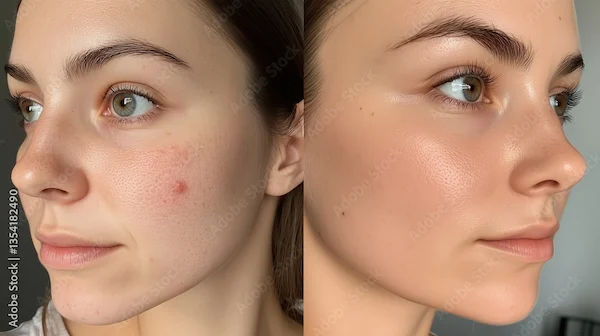Glycolic Acid and Acne: Everything You Need to Know
Description: Discover how glycolic acid can help treat acne. Learn about its benefits, usage, side effects, and tips for incorporating it into your skincare routine effectively.

Written by Dr Sonia Bhatt
Last updated on 3rd Jul, 2025
Acne is a common skin concern that can affect people of all ages. It often leads to frustration and a search for effective treatments. One ingredient that has gained significant attention in the skincare world for its acne-fighting properties is glycolic acid. But what exactly is glycolic acid, how does it work, and how can it help treat acne? In this article, we’ll explore everything you need to know about using glycolic acid for acne, its benefits, and how to incorporate it into your skincare routine.
What is Glycolic Acid?
Glycolic acid, also known as hydroxyacetic acid, is a type of alpha hydroxy acid (AHA) that is primarily derived from natural sources like sugarcane. However, it is also found in fruits and plants like unripe grapes and sugar beets. It is renowned for its small molecular size, which allows it to penetrate the skin more effectively than other AHAs. This characteristic makes glycolic acid a powerful ingredient in skincare, particularly for treating acne and improving overall skin health.
As a chemical exfoliant, glycolic acid works by breaking down the bonds between dead skin cells, promoting their removal from the skin's surface. This exfoliation process helps to unclog pores, preventing the formation of acne and promoting a smoother, more radiant complexion. Additionally, glycolic acid has antibacterial properties that reduce the presence of acne-causing bacteria on the skin.
Moreover, glycolic acid stimulates collagen production, which is essential for skin repair and renewal. Increased collagen levels lead to improved skin texture, reduced appearance of acne scars, and overall firmer, healthier skin. By incorporating glycolic acid into your skincare routine, you can achieve clearer, smoother, and more youthful-looking skin, making it an invaluable ally in the fight against acne.
How Glycolic Acid Helps Treat Acne?
Glycolic acid is a versatile ingredient that offers a range of benefits for acne-prone skin. Here’s a detailed look at how glycolic acid can transform your skincare routine:
Unclogs Pores
Acne is often caused by blocked pores, which trap oil, dead skin cells, and bacteria beneath the skin's surface. Glycolic acid removes these dead skin cells and reduces the buildup that can lead to clogged pores. By regularly exfoliating the skin, glycolic acid prevents pore blockages and helps reduce the formation of comedones (blackheads and whiteheads), which are the precursors to more severe breakouts.
Prevents New Breakouts
As an exfoliant, glycolic acid helps to maintain clearer skin by continuously removing dead cells and debris that could otherwise clog pores. By incorporating glycolic acid into your skincare routine, you’re not only addressing existing breakouts but also preventing future ones.
Reduces Inflammation
Acne often causes redness and swelling, especially in inflamed pustules and cysts. Glycolic acid’s exfoliating properties can help calm inflammation by promoting healthier skin turnover and reducing clogged pores, making it effective in soothing the skin and reducing the appearance of active acne.
Improves Skin Texture and Tone
Acne can leave behind dark spots, scars, and an uneven skin tone. Glycolic acid helps by accelerating the skin’s natural healing process, reducing hyperpigmentation, and encouraging the production of new skin cells. This leads to smoother, more even skin over time, helping to fade post-acne marks and reduce scarring.
Enhances Skin Hydration
Unlike other harsh acne treatments that can leave skin feeling dry and irritated, glycolic acid has the added benefit of moisturising the skin. When used in appropriate concentrations, it helps to improve the skin’s ability to retain moisture, reducing dryness and promoting a healthy, hydrated complexion.
How to Incorporate Glycolic Acid into Your Skincare Routine?
Incorporating glycolic acid into your skincare routine can help achieve clearer, smoother skin. However, it’s important to use it correctly to maximise its benefits and avoid potential irritation. Here’s a step-by-step guide on how to effectively integrate glycolic acid into your regimen:
Start Slow: If you're new to glycolic acid, it's important to start slowly to avoid skin irritation. Begin by using a product with a low concentration of glycolic acid, typically around 5-10%. Use it once or twice a week to see how your skin reacts. Gradually increase the frequency and concentration as your skin builds tolerance.
Patch Test: Before applying glycolic acid to your entire face, perform a patch test on a small area of skin to check for any adverse reactions, especially if you have sensitive skin. This helps prevent irritation or allergic reactions.
Use at Night: Glycolic acid can make your skin more sensitive to the sun, so it's best to use it at night. Apply it after cleansing and before moisturising.
Don't Overdo It: While glycolic acid is effective, overuse can lead to irritation and dryness. Stick to using glycolic acid products 2-3 times a week and adjust based on your skin's response.
Combine with Hydrating Ingredients: To counteract any potential dryness, pair glycolic acid with hydrating ingredients like hyaluronic acid, glycerin, and ceramides. This will help maintain your skin's moisture balance.
Choosing the Right Glycolic Acid Products
With a plethora of glycolic acid products on the market, selecting the right one for your skin type and concerns is crucial. Here are some top-rated glycolic acid products to consider:
1. Cleansers
Glycolic acid cleansers are a great way to introduce the ingredients into your routine. They provide gentle exfoliation and can be used daily. Look for cleansers with a concentration of 2-4% glycolic acid.
2. Toners
Glycolic acid toners offer a mild exfoliation and are ideal for those with sensitive skin. They can be applied after cleansing to prepare the skin for subsequent products. Toners typically contain 5-7% glycolic acid.
3. Serums
For a more potent treatment, glycolic acid serums are an excellent choice. They penetrate deeper into the skin and deliver concentrated benefits. Serums usually have 8-15% glycolic acid and should be used a few times a week.
4. Peels
Glycolic acid peels provide intensive exfoliation and are best suited for experienced users. These peels often contain 20-30% glycolic acid and should be used with caution. It's advisable to start with lower concentrations and gradually work up.
Potential Side Effects and Precautions
While glycolic acid is generally safe for most skin types, it can cause some side effects, especially if not used correctly. Here are a few precautions to keep in mind:
1. Sun Sensitivity
Glycolic acid increases your skin's sensitivity to the sun, making it more prone to sunburn. Always apply a broad-spectrum sunscreen with at least SPF 30 during the day.
2. Irritation and Redness
Overuse of glycolic acid can lead to irritation, redness, and dryness. Pay attention to your skin's response and adjust the frequency of use accordingly.
3. Avoid Mixing with Certain Ingredients
Certain skincare ingredients, such as retinoids and other AHAs or BHAs, can increase the risk of irritation when used with glycolic acid. It's best to use glycolic acid on its own or with hydrating and soothing ingredients.
Conclusion
Glycolic acid is a versatile and effective ingredient for treating acne and improving overall skin health. Its exfoliating, antibacterial, and collagen-boosting properties make it a valuable addition to any skincare routine. By starting with a lower concentration, using it at night, and combining it with hydrating ingredients, you can unlock clearer, smoother, and more radiant skin. Always remember to protect your skin from the sun and listen to your skin's needs to enjoy the full benefits of glycolic acid without unwanted side effects.
If you are uncertain about the suitability of glycolic acid for your skin or if you experience any adverse reactions, it is advisable to seek guidance from a dermatologist. A professional consultation can provide you with a personalised skincare regimen tailored to your specific acne concerns, ensuring optimal results and promoting clear, healthy skin.
Consult Top Dermatologist
Consult Top Dermatologist
Dr. Mayuri Jain
Dermatologist
11 Years • MBBS, MD Dermatology , Venereology & Leprosy
Delhi
Dr Mayuri Jain Clinic, Delhi
Dr. Kavitha Killaparthy
Dermatologist
23 Years • MBBS,DIPLOMA(DERMATOLOGY,VENEREOLOGY,LEPROSY)
Hyderabad
JDS Skin & Hair Clinic, Hyderabad
Dr. Paulomi Vartak
Dermatologist
2 Years • MBBS, MD (DERMATOLOGY,VENEREOLOGY AND LEPROSY)
Pune
Pramodini Urology Foundation and stree clinic, Pune
Dr.j Girishma
Dermatologist
6 Years • MBBS MD DERMATOLOGY
Bengaluru
Apollo Medical Center, Marathahalli, Bengaluru

Dr. H R Yogeesh
Dermatologist
20 Years • MBBS, MD (Dermatology, Venereology & Leprosy)
Bengaluru
Akshata skin and hair care, Bengaluru

